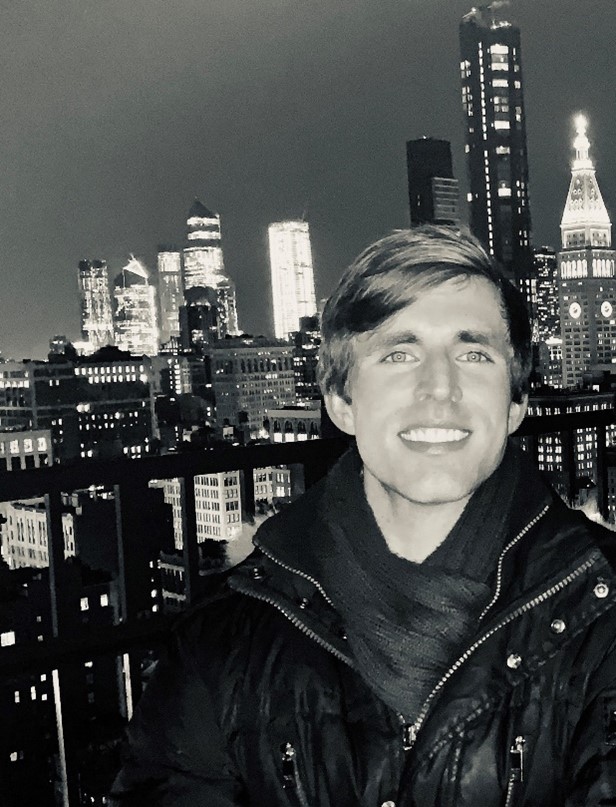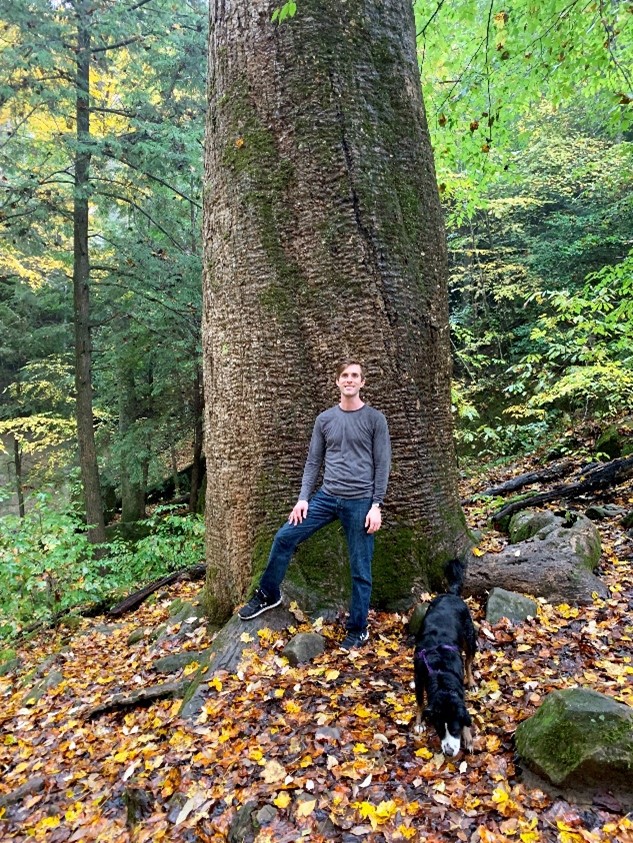 ASLE’s Scholar of the Month for January 2021 is Nicholas Tyler Reich.
ASLE’s Scholar of the Month for January 2021 is Nicholas Tyler Reich.
Nicholas Tyler Reich (he/they) is a doctoral student at Vanderbilt University’s Department of English, where he studies queer and trans ecologies, literatures of the US Deep South and Appalachia, energy ontologies, film, and digital media. Their work has been published or is forthcoming in The Edgar Allan Poe Review, ISLE, the upcoming edited collection The Anthropocene: Approaches and Contexts for Literature and the Humanities, and elsewhere.
How did you become interested in studying ecocriticism and/or the environmental humanities?
Once, while driving ATVs (or “four-wheelers,” if I’m honest) through abandoned strip mines near where I grew up in the region now called Alabama, I saw a man, in perfect silhouette against the setting sun, crash into a half-buried dozer blade. His ride went one way, he went the other, pirouetting off the hilltop. Real mess. In this landscape pockmarked by mining equipment, I used to steal up into an enormous crawler crane locals called the General Sherman. (I’m not making this up.) Rumor was it was too big and costly to move after the job was done, so there it sat. There were photos hanging on the oily cabin walls, pin-ups and family side-by-side. This same family of mines re-opened years later for fracking. The blasts sent shockwaves across the hills, even cracking the drywall in my granny’s house some miles away. Or so she swore. Fuel and fire, coal and nuclear, extraction and machines, toxicity, paper plants, chicken farms, family(!), lard, gunmetal conservatism, environmental injustice, gender weirdness like you wouldn’t believe, and a green unimaginably deep. (Did you know Alabama is home to some of the greatest biodiversity in North America? For now, at least.) Since I was queer, I often felt an outsider to Southern, South-Appalachian theater. Yet I still love the smell of gasoline, and I’ve certainly learned better this region’s capacity for queerness.
So when I arrived at Eli Clare’s Exile and Pride, Scott Herring’s Another Country, Nicole Seymour’s Bad Environmentalism, or Cara Daggett’s ideas on “petro-masculinity,” I was ready and eager to absorb that knowledge. I’ve been trying to get a grip on this strange region from my first whiff of lighter fluid on pine straw.

Me and Eve at Alabama’s largest recorded tree, a Yellow Poplar in Bankhead National Forest approximately 150 feet tall, even after the lightning strikes. One winter I got lost in these woods overnight, stalked by a mountain cat through the dark for over an hour—no flashlight, sheets of ice falling of the bluffs like applause.
Who is your favorite environmental artist, writer, or filmmaker? Or what is your favorite environmental text? Why?
Tough question! To the Lighthouse? Daughters of the Dust? I re-watched Werner Herzog’s Lessons of Darkness recently, researching an essay on gender and fire. There are exactly two women, both traumatized, in that film of igneous men, a geo-social elegy to the world on fire. Then again, there’s the time I listened to M. NourbeSe Philip reading Zong! on Virginia Key, accompanied by a dancing spirit. We threw white roses into the ocean to commemorate those murdered on the passage. Text-as-experience?
I don’t really have a favorite. But, in the spirit of the question, here are three environmental-ist texts I’d highly recommend. L. H. Stallings’s Dirty South Manifesto is a tour de force in disruptive thinking, imagining ways to unseat the New South from below and get at something closer to environmental, racial, gender, and sexual justice. (This book is also the reason I listened to Millie Jackson’s “Slow Tongue” for the first time. Such a gift.) ANOHNI’s protest album Hopelessness tells another story of gender and fire that is all about taking accountability and exercising dread. (Listen to “4 Degrees” with good headphones in front of a fire.) Then, because the environmental humanities can sometimes get a bit…righteous, I’d round things off with The Toxic Avenger, a truly horrible and amazing Troma slasher-comedy from the early 80s in which a young, frail boy falls into a vat of toxic waste that transforms him into a super-powered vigilante. Ribald doesn’t quite describe its transgressions. And that’s always fun.
What are you currently working on?
This year, I’ve finished two articles looking at US petro-cultures through a trans lens, taking up objects from Instagram photography to pop albums and music videos to film. Like Matt Henry, I’m working with just transitions, environmentalism that accounts for social equity. But I’m also speculating about how trans entanglements with fossil fuels can provide diagnostic tools for considering more generally something like what Stephen J. Pyne calls the Pyrocene, or what I’ve called the Trans*Plantationocene. I hope to see these essays in print sometime soon.
Next year, I’d like to make headway on a project focused around Affrilachian poetry, thinking about the plurality of region, extractive injustice, and the unpredictable coalitions that arise from labor disputes in the mines. (Katie Hogan’s work on coalitional thinking in Queer Ecologies is a great inspiration in this way, as is Kathryn Yusoff’s.) I’ve also been invited to participate in Vanderbilt’s Institute for Energy and Environment on a research program about energy equity. This is an interdisciplinary group for sharing energy concerns within and without the university. I’d love for this to be an opportunity for more public-facing, activist engagement.
What is something you are reading right now (environmental humanities-related or otherwise) that inspires you, either personally or professionally?
I’ve recently finished two books that were totally breathtaking and inspiring. First was Heidi C. M. Scott’s Fuel: An Ecocritical History, which traces Western attitudes toward energy use in literature from the eighteenth century to the present, building chapters around grass, coal, oil, and natural gas. Even with a scope that large, Scott show-stops at every turn. And the writing is incredible, describing the Anthropocene, for instance, as “a geological era inscribed in fossil fuel fonts.”
Next was Greta LaFleur’s The Natural History of Sexuality in Early America, arguing that eighteenth-century natural history actually subtends sexology the century following and into many of our ideas about sexuality today. With every page, I thought, sometimes aloud…Oh ok, so the history of sexuality is experiencing an epochal shift with LaFleur’s name on it. I would re-read paragraphs just to make sure I wasn’t inflating the ideas. I never was!
Is there a scholar in the field who inspires you? Why?
The list gets longer every day: Stacy Alaimo, Stephanie LeMenager, Cara Daggett, Kathryn Yusoff, Kim TallBear, Tiffany Lethabo King, Eva Hayward, Imre Szeman, Catriona Sandilands, Jennifer Fay, Jean-Thomas Tremblay, Mel Y. Chen, and so many more.
But Nicole Seymour’s is the career I’d most like to emulate. (I’ve told her as much.) Bad Environmentalism is so unapologetically fun, especially when her critical insights are cutting right to the bone. Her writing not only takes up unusual objects, but it does so in a way that invites play and curiosity without the burden of gate-keeping or exclusivity. Not to mention, she’s a Vandy alum.
